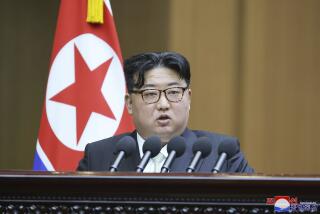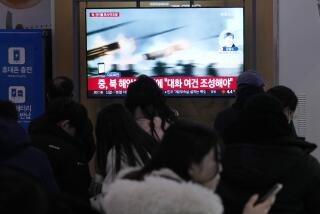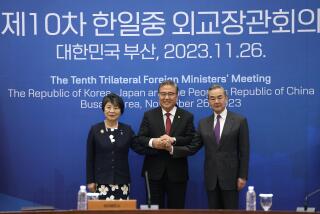Asian Games talks between North, South Korea break down
Talks over North Korea’s participation in the Asian Games in Incheon broke down Thursday over issues including who would foot the expenses of the athletes’ and cheerleaders’ visit to South Korea.
Thursday’s meeting took place in the truce village of Panmunjom along the demilitarized zone that separates South and North Korea. It was the first meeting between the two Koreas in five months, and the first related to sports since 2008.
The two sides spent the first part of the day exchanging their basic positions on the logistics of the North Koreans’ visit to the South for the sporting event in September, but North Korean delegates took umbrage with something said in the afternoon session and abruptly left, one official close to the talks said on condition of anonymity.
North Korea’s official Korean Central News Agency said Friday that the delegation from Seoul “made an abrupt U-turn” in afternoon discussions and “took a challenging approach” toward Pyongyang.
North Korea announced this month that it intended to send athletes and a cheering squad to the games, which will be held in Incheon, a port city in South Korea’s northwest.
The government in Pyongyang said Thursday that it planned to send 350 athletes and a 350-person cheering contingent to the games, which are held every four years. The 2010 games were held in China.
North Korea also sent athletes and a cheering squad to the Asian Games in 2002, when they were held in the South Korean city of Busan. Such cooperative projects once were common between South and North Korea, but over the last few years have been halted due to political tensions.
Among the issues on the agenda Thursday was figuring out how the North Koreans will travel to the South in September. In 2002, the North Korean cheering squad traveled to the South on a ship that also served as their accommodations, but under current South Korean sanctions, all North Korean vessels are prohibited from entering South Korean waters.
Another potentially thorny issue surrounding North Korea’s participation in the games is who will cover the costs of the delegation’s travel. In the past, the South had borne the majority of the expenses, but on Thursday an unnamed South Korean official told Yonhap News Agency that the South would “follow international practices” regarding the cost of the North Koreans’ trip.
The official’s comments seemed to suggest the South wanted the impoverished North to follow the custom of covering travel expenses for its delegation.
KCNA said the South “made absurd assertions” that the delegation was too large and went so far as “to talk about paying one’s own expenses.”
According to KCNA, other sticking points in the discussion included the size of various flags.
The North said it regarded the “attitude of the South side as a deliberate act to bring the working talks to a rupture” and prevent the North from taking part in the games.
“If the South side insists on such defiant attitude, [North Korea] will fundamentally reexamine its participation in the games,” KCNA said.
North Korea has been sending mixed messages of rapprochement and hostility in recent weeks. Pyongyang proposed holding Thursday’s talks, but in recent weeks has also been launching missiles and other projectiles off the country’s east coast.
South Korea’s Joint Chiefs of Staff reported this week that North Korea fired hundreds of shells near the North-South border. South Korean media showed images of the launches, which took place close enough to South Korean territory to be seen from an observatory on the South side of the demilitarized zone.
North Korean official media released photos of the launches being overseen by leader Kim Jong Un. It is unusual for North Korea to conduct such launches so close to the border.
“For North Korea, that was purely intended as a display of strength,” said Kim Yong-hyun, a professor of North Korean studies at Dongguk University in Seoul. “They’re trying to show the outside world that they’re not going to be dragged into anything they don’t want to do.”
Borowiecz is a special correspondent. Times staff writer Julie Makinen in Beijing contributed to this report.
More to Read
Start your day right
Sign up for Essential California for news, features and recommendations from the L.A. Times and beyond in your inbox six days a week.
You may occasionally receive promotional content from the Los Angeles Times.






